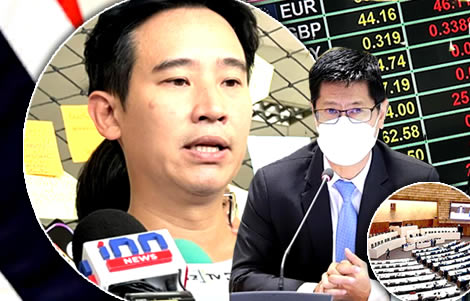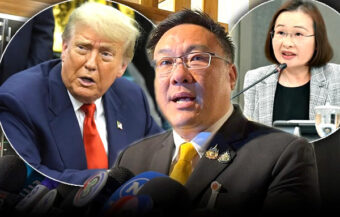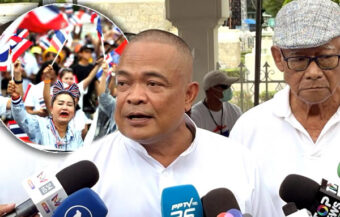A vote that delivers a new government led by Move Forward Party leader Pita Limjaroenrat would lift investor sentiment immediately next Thursday but all the political signs suggest this may not be the case. Another potential positive is good news this week from the Ministry of Commerce with Thailand on target for the 6th lowest rate of inflation in the world and the lowest cost of living rise in the ten-member ASEAN bloc in Southeast Asia.
Thailand is already experiencing capital outflows and falling confidence as a result of rising political instability with a clear warning now coming from the country’s financial and investment markets that a protracted battle to elect a new Prime Minister after parliament meets for that purpose on Thursday, July 13th will see further sell-offs with a political stalemate threatening to dangerously exacerbate already serious problems facing the economy with disturbing setbacks in China, a volatile currency, a slowdown in manufacturing and real concern that the country’s inflated level of private banking debt may be a balloon on the verge of popping.

Investors in Thailand are watching the country’s tense political process play out very carefully with investment professionals predicting that the course of events over the next few weeks linked to the formation of a government, will have a direct impact on capital flows into and out of the country.
One firm in Bangkok, Asia Plus Securities (ASPS), is predicting that if a government is formed without a problem next Thursday, the 13th of July when Parliament meets in joint session, then the Bangkok Stock Exchange, the SET, can expect to rise to well over 1,600 points.
Danger of serious political instability if matters take a course that hinders or distorts the people’s will expressed in the May 14th General Election
However, this is unlikely to happen with the very real prospect that Thailand could be facing a serious political and constitutional crisis if matters take a course that political analysts increasingly fear it will.
That fear centres on the potential for public discontent and anger if the will of the people expressed in the May 14th General Election is frustrated, impeded or distorted by the country’s unelected Senate appointed by the outgoing National Council for Peace and Order (NCPO) or military junta in one of its last acts in 2019.
Investment analysts are also pointing to the continued rise in US interest rates as the US Federal Reserve continues to surprise many analysts with its hawkish approach to the economy stateside where inflation remains stubbornly elevated although falling to 4.1% in May from 4.9% in April.
Another factor that is impinging fundamentally on the Thai economy is a serious downturn in China where not only has GDP growth disappointed up to this point but with disturbing indicators of a crisis coming to a boil in the country’s property and banking sector.
Goldman Sachs downgrades key Chinese banks as disturbing economic news continues from China
The situation has led Goldman Sachs this week to downgrade key Chinese banks including the Agricultural Bank of China (ABC) and the Industrial and Commercial Bank of China (ICBC).
The influential global investment house rated both institutions as a sell, having previously designated them as buys.
This week, Asia Plus Securities, the Bangkok brokerage house, suggested that if a protracted vote on the election of a prime ministerial candidate from the eight-party coalition bloc representing 62% of MPs in the Thai lower house or House of Representatives, leads eventually to a new prime minister in a negotiated settlement or compromise, then Thai stocks should remain neutral in a range which would see the set at 1550 to 1600 points.
Pheu Thai may face a terrible dilemma as outgoing government parties still aim for power in the PM vote
Debt crisis may be one of the top items on the new cabinet’s agenda as the central bank stands ready
Breakthrough deal could see either Pita or Srettha take job as Thailand’s 30th PM on July 13th in key vote
However, if the Move Forward Party candidate, Mr Pita Limjaroenrat, fails to be elected and a situation develops where the coalition is unable to elect a prime minister from either the Move Forward or Pheu Thai parties, then Thai stocks will see a significant sell-off, driven not only by the country’s political instability but also by an increasingly precarious economic situation.
Thailand’s economy is suffering from an acute downturn in Western markets where a ‘cost of living crisis’ is developing caused by higher loan costs
Thailand is already suffering from a slump in exports and reduced economic demand worldwide caused by high-interest rates and what has been called a cost of living crisis in many Western countries.
This is already impacting consumer spending in those countries and thus reducing the demand from manufacturing centres in countries such as China and Thailand.
Economic analysts, this week, have also noted that the Thai Baht and the Chinese currency, the Yuan, are linked in terms of trade and Thailand’s dependency on China for foreign tourism.
The Federation of Thai Capital Market Organisations (Fetco), this week noted that while investor confidence in June was up 5.1% among Thai investors, the situation is now deteriorating.
It said the key factor was the rising concern in the market about the threat of political instability driven by the difficulties that are emerging in the formation of a new government.
Investor confidence is beginning to deteriorate even at home as capital outflows since the start of the year have seen ฿106 billion leave Thai markets
In addition to this, significant capital outflows from the country are also being noted, while the danger of geopolitical conflict is rising significantly.
Over the last week, concerns have also been expressed about Thailand’s dangerously high level of household debt with concerns that a significant amount of loans on the books of commercial banks are revolving continuously.
One analyst estimated that up to ฿7.8 trillion in personal loans in this system are uncollateralised triggering concerns about household debt.
There has been a high default rate in auto loans within the system which are seen as having the potential to significantly increase the non-performing loan rate of Thailand’s commercial banks which are already the highest in the ASEAN bloc.
Potential hazard lights flashing as kingdom’s auto loans spiral into default with sky-high borrowing
The Federation of Thai Capital Market Organisations (Fetco), which is an umbrella group for key players in Thailand’s capital market, this week, confirmed that foreign investors have sold ฿106 billion out of Thai capital markets since the beginning of the year.
Stock market and the Thai currency are both being impacted by mounting concerns making the current threat of political instability very dangerous
This has impacted Bangkok’s Stock Exchange of Thailand (SET) Index which fell below 1500 points in June, a new two-year low.
On the 7th of July, the Thai baht was worth ฿35.17 against the US Dollar, representing a 4.61% decline since the 10th of May 2023, or four days before the May 14th General Election.
The poll delivered a stunning result when the radically progressive Move Forward Party emerged victorious.
The baht has recovered some ground since the 29th of June. It was valued then at ฿35.60 to the dollar, representing a 5.89% decline.
Krungsri Bank predicts that the baht may experience further volatility due to the political situation and also rising US interest rates which have a direct bearing on the value of the Thai currency.
It is also coming under significant pressure because of China’s economic malaise, where an expected recovery in the economy after the Covid crisis has failed to materialise, with concern that behind China’s often artificially created economic data, there may be a significant and even permanent decline in the Chinese economy.
Bank of Thailand may have no choice this year but to keep raising interest rates, making it more difficult for already over-extended Thai borrowers
In addition to this, the Bank of Thailand’s Monetary Committee is taught to be left with no option but to increase interest rates as the Federal Reserve continues its crusade against the threat of inflation.
Thailand’s borrowing rates are already well below its regional peers, leaving the Thai central bank now with little room to manoeuvre.
Despite its policy last year on holding off on interest rates so as not to kill off the economic recovery, the current weakness in Thai borrowings and rising debt in the banking system gives some indication as to another reason why the central bank adopted this approach in 2022.
Last week, an assistant governor with the bank pointed out that many banks were not passing higher borrowing costs to their customers because of the weakness of the economy. But this may not be sustainable in the long term.
The combination of dangers to the economy puts increased pressure on those tasked with the formation of a new government, with business and industry leaders urging politicians to put their differences aside in the interests of the country.
Inflation news from the Ministry of Commerce a welcome bright spot with Thailand having the 6th lowest inflation rate in the world, lowest in ASEAN
The Deputy Director of Trade Policy and Strategy at the Ministry of Commerce, on Wednesday, gave a briefing.
Mr Wichanan Niwatchinda highlighted that inflation had risen by only 0.23% from the same month last year, a spot of bright news for a change.
He pointed out that food and beverages fell by 1.88% in that period.
The figures presented by the senior ministry official highlighted that Thailand’s inflation rate is running at the lowest level in 22 months because of a sharp fall in the price of meat products, particularly pork.
Mr Wichanan said this had come about through increased productivity in the meat processing sector.
He said that the average inflation rate for June 2023 showed a price increase of 0.6% for the month with non-food and beverages increasing by 1.5% while the price of food and non-alcoholic beverages decreased for the month by 0.02%.
This left an average inflation rate for the first six months of the year from January of 2.49%.
‘From the third quarter until the end of this year, we think inflation will tend to go down because the price of fuel and energy is quite stable at the moment when compared to last year. Meat prices will also continue to drop as production is set to increase. The inflation rate in the third quarter of the year should be 0.77% falling to 0.62% in the last quarter.’
Inflation may end up at 1.5% by the end of 2023
The Fiscal Policy Office has lowered its inflation estimate for 2023 from an original range of 1.7% to 2.7% with a median value of 2.2% to 1-2% with a median value of 1.5% for the year now being projected.
Mr Wichanan cautioned that there were still several risk factors, in particular, that geopolitical conflict may again impact energy prices and also the kingdom’s weather which may impact the price of vegetables, fruit and other food products.
He noted that based on current estimates, Thailand is on target for the sixth lowest inflation rate in the world when compared to 126 countries and the lowest rate in the ASEAN community.
At the same time, the government official also warned that consumers were taking note of the political situation with the Consumer Confidence Index for June dropping slightly from 56.6 to 56.1.
Despite boosted tourism income and a better domestic economy, consumer confidence has begun to decline as the public weighs up the political threat
He attributed this directly to the potential for political problems associated with the election of a new government in Parliament.
Against this, he pointed out that the domestic economy continues to be soundly driven by a substantial recovery in the tourism industry with activity in domestic markets being generated by both Thai and foreign tourists as well as government measures which are aimed at reducing the cost of living and in particular keeping electricity costs under control.
Despite this, he warned that the political situation may harm decisions in the business sector concerning private investment and also noted that public investment may also be slowed down from this moment forward.
Mr Wichanan referred to the rising concern that the high level of household debt in the banking system is being exacerbated by rising interest rates and borrowing costs.
He said in addition to increasing the costs of families and businesses, such an environment also contributes to deflated confidence overall.
Join the Thai News forum, follow Thai Examiner on Facebook here
Receive all our stories as they come out on Telegram here
Follow Thai Examiner here
Further reading:
Debt crisis may be one of the top items on the new cabinet’s agenda as central bank stands ready
Potential hazard lights flashing as kingdom’s auto loans spiral into default with sky-high borrowing
Bank of Thailand governor gives veiled warning to voters on the danger posed by populist policies
Financial markets debt sell-off sending a signal to Thailand before the May 14th General Election
PM warns giveaway policies of some parties may be ‘bad karma’ for the country in the longer run
Economic recovery shaky despite strong foreign tourism as global economic outlook deteriorates
Recession fears rise as growth projections are cut and export output continues to decline in 2023
Economy faces export clogs with rules in China and ‘green imperialism’ from European Union
Vital European Union free trade deal with Thailand with stiff demands from Brussels to take time
Thailand’s financials are sound but the economy is exposed if another world banking crisis emerges
Thai economic woes grow with a 10-year high trade deficit as January exports slumped by 4.5%
Credit crunch as firms seek more bank loans with tightened lending criteria and recession fears
Even as the baht surges, Thailand faces economic recession in mid-2023 with lower earnings


















